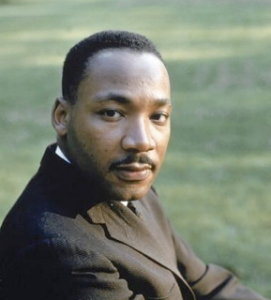Contributed by Jennifer Arvin Furlong
 In the U.S. we celebrate Dr. Martin Luther King Jr.’s legacy the third Monday of January every year. January 18 marks his birthday, so naturally our news media are filled with images of celebrations and parades from across the country. These images are usually combined with lessons about King’s life and his vision for a less divided nation. Most of those stories will focus on his most well-known speech, “I Have a Dream,” and rightfully so. It’s a wonderful speech that influenced the federal government to take more direct action regarding civil rights. If you have not yet watched his most memorable speech, then there’s no time like the present.
In the U.S. we celebrate Dr. Martin Luther King Jr.’s legacy the third Monday of January every year. January 18 marks his birthday, so naturally our news media are filled with images of celebrations and parades from across the country. These images are usually combined with lessons about King’s life and his vision for a less divided nation. Most of those stories will focus on his most well-known speech, “I Have a Dream,” and rightfully so. It’s a wonderful speech that influenced the federal government to take more direct action regarding civil rights. If you have not yet watched his most memorable speech, then there’s no time like the present.
I’m going to take this opportunity to focus on another MLK speech, “I’ve Been to the Mountaintop.” In my humble opinion, this is his best speech…ever. Yes, I said it! I think it’s better than the “Dream” speech. I will even go so far as saying that after watching this speech, if you feel nothing, then you, my dear, have no soul.
What makes the “Mountaintop” speech so special? Like his other speeches, it has all the standard King elements: vivid imagery combined with a strong rhythmic sense that connects you emotionally and spiritually to the message. This speech, however, unbeknownst to everyone, was to be his last. And as you listen to his message, it has a chilling and lasting impact when you understand that fact. In a way, it feels as if he is delivering his own eulogy.
King delivered this final speech on April 3, 1968 at the Mason Temple in Memphis, TN. His message focused primarily on the strike that the sanitation workers were holding in their struggle to gain equal pay for equal work. As with his other speeches, he emphasized the importance of nonviolent protest and the desire for equality and unity. Unlike his other speeches, he alludes to and discusses the possibility of his untimely death.
He began the speech by taking the audience on a trip through time. He highlighted important aspects of history as he answered a question presented to him by God, “which age would you like to live in?” After considering the possibility of living in any age, he said, “If you allow me to live just a few years in the second half of the 20th century, I will be happy.” He made that statement to emphasize that despite the difficult times, he was happy to live during that period because he felt everyone was being forced to recognize the importance of human rights. He found it to be an opportunity “to make America a better nation.”
He talked about the time he was stabbed in the chest and would have died if he had just sneezed. He talked about the threats that were out and the concerns for his personal safety. He exclaimed, “Like anybody, I would like to live a long life. Longevity has its place. But I’m not concerned about that now. I just want to do God’s will. And He’s allowed me to go up to the mountain. And I’ve looked over. And I’ve seen the Promised Land.”
In his final words of this historic speech, King opened his heart to his audience. In his revelation he made clear his determination to remain steadfast and to not give in to fear regardless of what might happen in the future. I often wonder what King would think about how far we’ve come as far as the Civil Rights struggle in America. I also wonder what words of encouragement he would offer as we continue to grapple with race relations. We don’t have to look far. Pick any King speech and you will find yourself transfixed by his words that were filled with so much hope for all of humankind and with the encouragement to keep marching forward. Perhaps this is the greatest lesson of all.
###
Jennifer Furlong is a CAL DL student working on her PhD in English Language and Applied Linguistics. She has 25 years’ experience in the communication field and teaches communication and public speaking courses in the U.S. She earned a B.A. and M.A. in Communication from George Mason University in Fairfax, Va. She currently resides in Richmond Hill, Ga. with her family of canines, felines, and humans. She also writes and maintains a blog on communication and the challenges of studying for a PhD: https://www.communicationtwentyfourseven.com/

Join the discussion
0 people are already talking about this, why not let us know what you think?